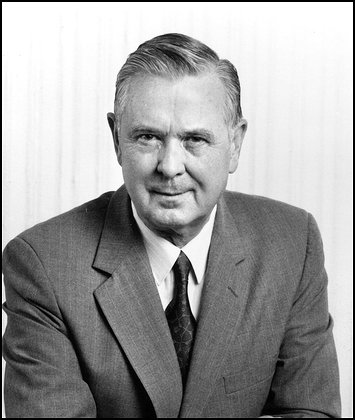From Contemporary press reports
Irvine H. Sprague, former chairman of the Federal Deposit Insurance Corporation, died Tuesday of cancer at Arlington Hospice Center in Virginia, his brother Tom said. He was 82.
Sprague first was nominated in 1969 by President Johnson to the board of the federal agency that supervises banks and insures deposits. He left the post in 1972 and worked for then-House Speaker Thomas P. “Tip” O’Neill, D-Massachusetts. President Carter nominated him to return to the FDIC in 1979. He served as chairman from 1979 to 1981, and remained on the board through 1985.
He wrote a book about his work handling 374 bank failures, “Bailout.”
Donald Powell, the current FDIC chairman, said Sprague’s life “was devoted to service to our country,” and noted that he chaired the FDIC “at a difficult time for the banking industry.”
Before joining the FDIC, Sprague served as Johnson’s chief liaison to Capitol Hill, as a congressional aide and as the lobbyist for the state of California.
Sprague was born in San Francisco and began his career as a reporter with The Record of Stockton, Calif., before entering Democratic Party politics. He came to Washington in 1957 as an aide to newly elected Rep. John McFall, D-California.
He received a Purple Heart and two Bronze Stars in World War II and later served on General Douglas MacArthur’s staff in postwar Japan.
Survivors include his wife and a daughter. Two sons preceded him in death.
Burial is scheduled for April 16, 2004, at Arlington National Cemetery.
Irvine H. Sprague, 82, the former Chairman of the Federal Deposit Insurance Corporation, who led the bailout of many large banks during the 1970s and 1980s, died of cancer February 17, 2004, at Arlington Hospice Center. He lived in Great Falls, Virginia.
After he retired as chairman of the FDIC, he described in his book “Bailout” how he worked his way through 374 bank failures.
“The truth is that big banks are treated differently from small ones,” Mr. Sprague wrote in a 1986 op-ed article. “The tiny handful of mega-banks engaged in international endeavors enjoy particularly favored treatment. . . . Adding insult to injury, the smaller banks are in effect subsidizing the larger brothers, their most feared competitors.”
Mr. Sprague was nominated in 1969 by President Lyndon B. Johnson to the board of the federal agency that supervises banks and insures deposits. In 1972, he left the agency to work for then-House Speaker Thomas P. “Tip” O’Neill (D-Massachusetts). President Jimmy Carter nominated him to return to the FDIC in 1979. He served as chairman from 1979 to 1981 and remained on the board through 1985.
He served the FDIC longer than any other Director.
Mr. Sprague’s Washington career began in 1957 as an aide to Congressman John McFall (D-California) after he headed McFall’s election campaign. In 1963, he became a lobbyist for the state of California in Washington. In 1967, he spent two years as chief liaison to Capitol Hill for President Johnson.
Born in San Francisco, he graduated in 1947 with degrees in economics and English from the College of the Pacific in Stockton, California. Before going into government service, he was a reporter for the Stockton Record.
Mr. Sprague was drafted into the Army as a Private during World War II and later became an officer. He was awarded the Purple Heart and two Bronze Stars as an infantry rifle platoon leader in the Philippines. He was a postwar member of General Douglas MacArthur’s staff in Tokyo and retired as a Lieutenant Colonel.
He was part of the Advanced Management Program at Harvard University in 1972. Mr. Sprague enjoyed traveling and visited all 50 states and 38 foreign countries.
Survivors include his wife of 63 years, Margery Craw Sprague of Great Falls; a daughter, Kristine Ann Woods of Silver Spring; five grandchildren; and four great-grandchildren.
SPRAGUE, IRVINE H
- LTC US ARMY
- WORLD WAR II, KOREA, VIETNAM
- DATE OF BIRTH: 07/04/1921
- DATE OF DEATH: 02/17/2004
- BURIED AT: SECTION 66 SITE 2944-A
ARLINGTON NATIONAL CEMETERY
Michael Robert Patterson was born in Arlington and is the son of a former officer of the US Army. So it was no wonder that sooner or later his interests drew him to American history and especially to American military history. Many of his articles can be found on renowned portals like the New York Times, Washingtonpost or Wikipedia.
Reviewed by: Michael Howard


